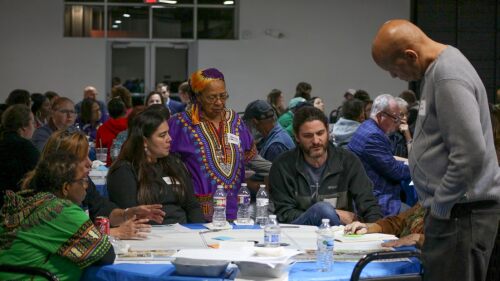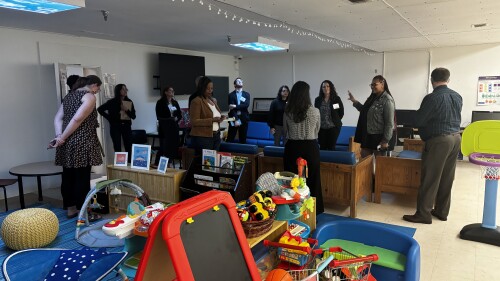Affordable and workforce housing policies and programs put in place by the governments of New York City, Los Angeles County, and the states of New Jersey and New York have been selected as finalists for the 2018 ULI Larson Housing Policy Leadership Award. The annual award, presented by ULI’s Terwilliger Center for Housing, recognizes innovative ways the public sector is addressing the nation’s affordable housing crisis. This year’s winner will be announced during the 2018 ULI Fall Meeting, October 8–11 in Boston.
The finalists are:
- Mixed Middle Income Program, New York City Housing Development Corporation, New York City. The Mixed Middle Income (M2) Program fosters economic diversity in the city’s neighborhoods by producing affordable units for different income levels. The program requires that at least 20 percent of units be designated for low-income households, at least 30 percent for moderate-income households, and no more than 50 percent designated for middle-income households. The M2 Program combines a first mortgage funded with proceeds from the sale of variable- or fixed-rate tax-exempt bonds with a second mortgage funded with New York City Housing Development Corporation corporate reserves and a third mortgage subsidy loan from the city’s Department of Housing Preservation and Development.
- Metro Affordable Transit Connected Housing Program (MATCH), Los Angeles County Metropolitan Transportation Authority (Metro), Los Angeles County. Metro’s affordable housing efforts were initiated in November 2013 following a study examining the nexus between housing affordability and transit ridership. The study culminated with the September 2017 launch of MATCH, a public/private lending partnership with an estimated loan capitalization of $75 million, leveraged with an $18 million combined investment from Metro, the California Community Foundation, the California Endowment, and the Weingart Foundation. MATCH preserves and expands the affordable housing stock near existing and proposed transit nodes in Los Angeles County.
- Mixed-Income Reserve, New Jersey Housing and Mortgage Finance Agency (NJHMFA), New Jersey. The Mixed-Income Reserve of NJHMFA’s Low Income Housing Tax Credit (LIHTC) Qualified Allocation Program (QAP) targets the need for mixed-income affordable housing projects that designate up to 55 percent of housing units for low- and moderate-income residents. About $2 million in tax credits are available, and regulations require that at least one urban and one suburban project be funded. The reserve was established in the QAP in 2013. The most recent round of LIHTC awards—the largest in the state’s history—took place in 2017 and included four Mixed-Income Reserve allotments.
- Community Restoration Fund (CRF), State of New York Mortgage Finance Agency. In June 2016, New York Governor Andrew Cuomo signed legislation authorizing the CRF, which has the ability to buy and modify delinquent mortgages to provide relief to struggling homeowners. The program engages a network of locally based nonprofit housing organizations to work directly with homeowners to offer principal reduction and other types of mortgage relief. Recently, the CRF purchased an additional 172 mortgages in a strategic effort to bring owners out of foreclosure and prevent property abandonment. The CRF has helped strengthen the financial position of homeowners, bringing stability back to the housing market in neighborhoods across the state.
“With workforce and affordable housing needs growing more severe across the country, state and local governments are rising to the challenge with creative, substantive solutions,” says ULI Terwilliger Center founder J. Ronald Terwilliger, chairman of Terwilliger Pappas Multifamily Partners. “This year’s Larson Awards finalists are excellent examples of leadership in addressing one of the most pressing issues faced by our communities—an issue that could undermine their ability to grow and thrive in the decades ahead.”
The Larson Awards recognize exemplary state and local programs, policies, and practices that support the production, rehabilitation, or preservation of workforce and affordable housing. The program was created in 2011 to honor the legacy of the late Robert C. Larson, a former ULI Foundation chairman and a longtime ULI trustee. The Larson Awards are part of the ULI Terwilliger Center’s housing awards program, which honors developments and programs that provide affordable, well-designed, and accessible housing choices for people with a mix of incomes, including families earning up to 120 percent of an area’s median income.
The program recognizes states and localities that undertake a broad range of policy and administrative initiatives to support housing affordability. They can take the form of regulatory or administrative changes such as allowing higher densities and waiving fees, or programs that provide grants or financing assistance. Policy programs are judged on a variety of factors, including impact on the supply of workforce housing, comprehensiveness of the tools and programs employed, involvement of public/private partnerships, and the ability to leverage private and nonprofit funds, among other criteria.
The finalists were chosen by a jury of national housing industry leaders. In addition to Terwilliger, members of the Larson Awards jury are: George Casey, president and chief executive officer, Stockbridge Associates; Alan George, executive vice president and chief investment officer, Equity Residential; Nina Janopaul, president and chief executive officer, Arlington Partnership for Affordable Housing; Gadi Kaufmann, managing director and chief executive officer, RCLCO; Dara Kovel, president of development, Beacon Communities; Linda Mandolini, president, Eden Housing; Michael Pitchford, president and chief executive officer, Community Preservation and Development Corporation; and Margaret Wylde, chief executive officer, Pro Matura Group.




